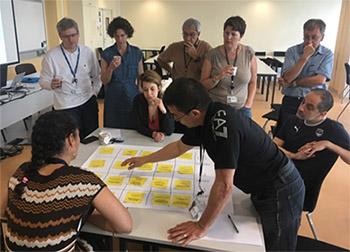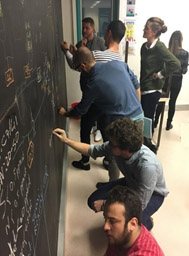IFP School is constantly reflecting on the future of its pedagogy. During 2018, following a proven methodology, it selected 40 innovations to imagine the school of the future. Goal: design tomorrow's IFP School, meeting students' expectations and the industry's needs for skills.
Using virtual reality to discover situations in the field, setting up a creativity room to support collaborative innovation, developing a mobile application to provide educational modules... these are just some of the many innovations deployed by IFP School, as part of its "school of the future" project.
"We collected 40 ideas from students, alumni and teachers at the school. This project not only addresses the pedagogical aspects but it also brings together proposals that make it possible to imagine the school of tomorrow in different ways," emphasizes Olivier Bernaert, project leader and teacher in the Processes for Energy and Chemicals field. "We try to collectively anticipate the transformations that are taking place within companies to connect our students to professional realities."
A pragmatic method and concrete ideas
Launched in January 2018, the project was born out of a recurring concern of IFP School: how to regularly update training courses and better prepare students for their professional life? "To answer this question, we drew inspiration from the approaches of design thinking, lean startup and entrepreneurship," says Olivier. "We have developed a methodology based on five phases: empathy, definition, testing, ideation and proposal."

The team first gathered proposals from a group of students, teachers and former students. Based on their recommendations, it identified 40 key ideas, which were detailed and translated into datasheets resembling game cards. The team then divided the participants into workshops to get them to react and test the ideas. Finally, it reviewed the feedback, selected, clarified the ideas and classified them into five categories: campus, digital, pedagogy, faculty and tomorrow's business.
Seven of the ideas proposed were identified by the IFP School Executive Committee for instruction and implementation for the next academic year: marketing, personalization of pathways, the student recruitment process, the construction of a virtual reality laboratory, internationalization, integration of new actors and alumni in an open loop environment.
Other ideas have already been implemented for the beginning of the academic year in September 2018. Let us discover together three pedagogical innovations, already established by the school.
Virtual reality
Equipped with smartphones and virtual reality glasses, IFP School students can now explore industrial sites without leaving their classroom.
The school sees it as a means of cultivating technical and soft skills. "When we talk about the distillation of petroleum products, for example, we first work on the technical know-how, i.e. the calculations to design a column," explains Olivier Bernaert. "Then, using virtual reality, we develop soft skills or how to inspect the column in the field."
Charles Guarin, 26, a student in the Energy and Processes program (ENEP 2019), agrees. "Thanks to virtual reality glasses, you can immerse yourself in the units of a refinery, which you can't do every week! We visualize the different equipments and we realize the complexity of the system."

Micro and mobile learning – gamification
Well-aware of the students' changing lifestyles and digital uses, IFP School has developed a mobile application that showcases short teaching modules. "The idea is to encourage student engagement by exploiting the playful fibre," says Clément Cahagne, head of the educational innovation hub at IFP School.
When logging into the application, students can, for example, discover the specifications of products such as gasoline or diesel in the form of a quiz. "It's another way to review and test our knowledge," says Charlotte Genet, a student in the Processes and Polymers program (POLY 2019). "It's much more interactive. We can even challenge the other students!"
Convinced of the cognitive benefits of gamification, IFP School relies on game mechanisms to diversify teaching and strengthen learning. "These devices help us set the pace of the courses, stimulate the intellectual curiosity and competitive spirit of our students," says Clément Cahagne. The use of innovative and diversified tools fosters student motivation, participation and collaboration.
Active learning classroom
As part of its reflection on pedagogy, IFP School is also interested in the impact of classroom ergonomics on student learning. The new space set up with the team led by Christophe Corlay, IT manager, is an example. Students can, among other things, write on the walls and arrange the furniture freely.
"By offering a pleasant and more flexible work environment, the school aims to stimulate creativity and encourage collaborative work - two soft skills that are highly valued by employers," says Olivier Bernaert.
To discover future developments, follow IFP School on social media. The school is constantly innovating!

Lexicon
- Design thinking: the set of methods that make it possible to solve an innovation problem by applying an approach similar to that of the designer.
- Lean startup: this concept refers to the idea that an entrepreneur must study the market before starting his or her activity. He/she will therefore have to conduct numerous investigations with his/her potential customers in order to offer an appropriate service.
- Open loop: the idea that training is built "throughout life."
- Active learning classroom: this notion is based on the idea that classroom design affects students' learning. The key words of an active learning environment are flexibility and interactivity.
Author of the article: Meyling Siu